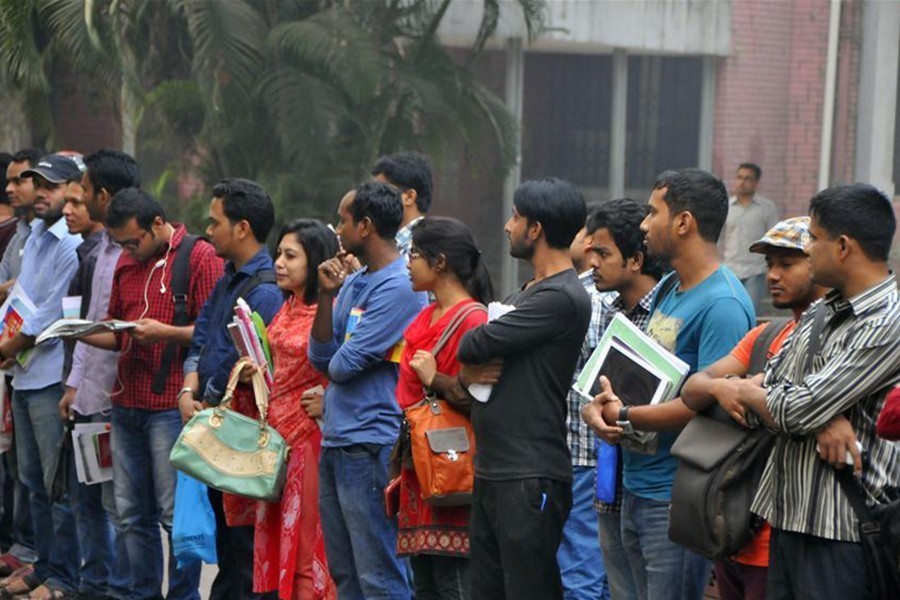Neighbouring India is set to exceed its fiscal year (FY) 2020-21 revenue collection target of $207.77 billion, reported international news agency Reuters, quoting two unnamed government sources.
But, instead of cutting its fiscal deficit or bank borrowing, the Indian government will use the higher revenue income to fund welfare programmes. 'The extra cash will go to rural job creation and to provide free cereals to the poor', said the Reuters report.
There could be questions about the efficient use of extra revenue on the Indian poor. What, however, is important here is the intent of the Indian government.
The prevailing employment situation arising out of the pandemic in India is rather dismal. People need jobs badly as the number of poor has increased since the deadly virus affected the economic activities seriously.
The situation is almost identical in Bangladesh where the poverty rate, according to private research studies, has doubled since the outbreak of Covid-19 in March 2020. The pandemic has reversed much of the gains achieved in poverty reduction here during the last three decades.
The growth of employment has slowed down in recent years. Historically, there has been a large gap between the number of people entering the job market every year and the employment opportunities created both in the private and public sectors. The gap has only widened for more than one and a half years further because of the pandemic. Innumerable people lost jobs, and many others saw a substantial cut in their regular incomes.
So, the primary goal of the Bangladesh government should be to create the maximum number of employment opportunities and help the poor and low-income people to raise their incomes. This has become imperative because of the soaring living costs.
The government has been implementing safety net programmes for the poor and disadvantaged section of the population. Weaknesses notwithstanding, the programmes have been helpful, to some extent. But the vast majority of the rural and urban poor and low-income people remain outside of the safety network. The government needs to help them, but it does not have enough resources to accomplish that task.
The surge in prices in essential items has only aggravated the sufferings of the poor and low-income people, who need more than normal earnings to face the worsening price situation. The latest hike in fuel oil prices by a big margin has made things far more complicated for them.
There should be no reason to believe that the Government of Bangladesh (GoB) is not as sensitive as the Indian government is in the matters of creating a higher number of jobs and making available food items to the poor families free of cost or at subsidised prices. But the budgetary allocations do not show any extra efforts by the government to generate additional employment. The Social Safety Net (SSN) programmes have been expanded this fiscal, but those are not enough to cope with the aggravating situation.
It is no denying that the government needs money to run its budgetary operations and meet expenses beyond that. But it cannot overlook the need of the people, that too, during one of the most difficult times in human history. It is a solemn responsibility of any government to help the people in need, even by reducing its other recurring or development expenses.
The ongoing trouble over the hike in prices of diesel and kerosene is a case in point. The government, according to an estimate, was incurring a loss of Tk 200 million per day on account of its fuel oil marketing. To offset the loss, it has hiked the price of diesel and kerosene by 23 per cent on Wednesday. The price rise has evoked protests from almost all quarters, including transporters, businesses and general consumers. The general opinion is that the government should not have hiked the fuel oil prices by such a big margin at one go. It could have also followed the Indian government's way of providing relief to the consumers. The Indian government on Wednesday reduced the duty and taxes to lower fuel oil prices.
It has become imperative for the government to deploy the maximum volume of resources in projects and programmes that would generate sufficient employment opportunities. If needed, the government can suspend the implementation of some less-priority projects for the time being to divert resources for the purpose. It may also ask the local level administration to take up food for works and test relief programmes. These programmes have been traditionally helpful in offering seasonal jobs to the rural poor.
The policymakers must be aware of the gravity of the situation in which employment is scarce and living cost is abnormally high. They now should show their true intent to help the poor and low-income people survive a difficult time. Politicians, at the helm of the country's administration, often claim that they always pursue pro-people politics. It is time for them to show that they are true to their words.


